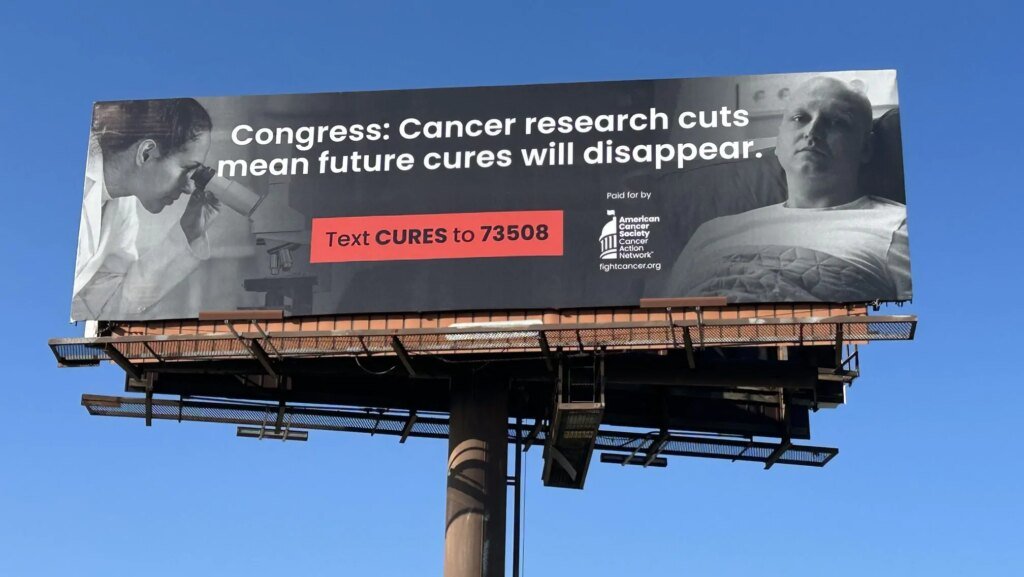American Cancer Society Pushes Back Against Proposed Budget Cuts
The American Cancer Society Cancer Action Network (ACS CAN) is making efforts to challenge proposed budget cuts to cancer research funding. They’ve kicked off a new advertising campaign featuring prominent billboards in Alabama.
Recently, the White House Office of Management and Budget suggested a reduction in the National Institutes of Health’s (NIH) budget, initially set at $27.9 billion, potentially slashing it to around $18 billion. Additionally, the Trump administration proposed a significant decrease in funding for the NIH’s National Cancer Institute, dropping it to $4.5 billion—about a 37% cut compared to last year.
In light of these proposed cuts and ahead of the upcoming Senate vote on the NIH budget for 2026, ACS is using billboards along Interstate 65 in Birmingham and Montgomery to draw attention to the threats facing cancer research funding.
One of the billboards boldly states, “Congress: Cancer research is reduced, meaning future treatments will disappear.”
Moreover, they are encouraging people to text “treatment” to a number for ways to get involved in advocating for cancer research funding.
ACS CAN has criticized the White House’s push for funding cuts, as the U.S. Senate prepares to vote on the NIH’s budget for 2026. Both Democratic and Republican lawmakers have spoken out against these cuts.
In a move divergent from the OMB’s proposal, the Senate Appropriations Committee voted overwhelmingly to increase NIH funding for 2026, approving an increase of $400 million, which includes $150 million earmarked specifically for cancer research.
ACS officials expressed appreciation for the Senate Budget Committee’s decision, highlighting the efforts of Alabama’s Director of Government Relations, Jane Adams, and Dr. Ancourt Saxena of the University of Alabama in Birmingham, who are advocating for budget expansion at the NIH.
However, Adams and Saxena noted that the outlook for cancer research funding remains precarious until the 2026 budget passes. Adams mentioned, “Research isn’t as secure as it used to be,” pointing out that cancer research funding was previously a widely supported bipartisan issue.
While acknowledging the Budget Committee’s favorable vote, Adams emphasized the continuous need for advocacy: “It’s not finished until it’s over. We’re thankful for what the Senate is doing, but we’ll keep pushing for substantial investment in cancer research until something is finalized.”
Adams believes the Senate’s vote reflects a broader disapproval of efforts to cut funding for critical health programs, stating that there is little support for the idea of eliminating cancer research funding.
Likewise, Saxena expressed cautious optimism about the Senate votes but echoed concerns over the uncertainty surrounding cancer funding. He pointed out that a reduction in funding would negatively impact Birmingham’s community and healthcare landscape.
“This state has a significant need to improve healthcare,” he said, recalling his decision to move to Birmingham to engage in meaningful research that benefits the community.
Doctors and researchers are currently working at the forefront of cancer studies, with notable clinical trials at UAB’s O’Neal Comprehensive Cancer Center paving the way for future advancements.
Saxena remarked, “Where you are in this country, the best work in health and happiness comes from science, technology, and healthcare,” emphasizing Birmingham’s role as a hub for biomedical research.
He highlighted that NIH funding plays a crucial role in supporting competitive research applications, which is essential for innovative cancer-focused research. “It’s a long road, but it’s important for people.”
The ACS CAN initiative comes at a time of uncertainty regarding NIH grant processes for the current fiscal year. Senator Katie Britt of Alabama, among others, has raised issues about the slow spending rate of NIH funds in a letter to the OMB.
Recently, the Trump administration momentarily halted NIH funding before retracting the decision later that same day. Adams described the slow approval rates for grant applications as troubling, which could jeopardize critical cancer research projects.
Both Saxena and Adams expressed concerns about the broader implications of NIH funding cuts on the local economy and healthcare infrastructure, noting the significance of NIH-supported research within the state.
Adams said, “This will impact the largest employers and cutting-edge hospitals, and it’s crucial given that Alabama faces around 30,000 new cancer cases annually.” Currently, 126 NIH-funded projects are operational across Alabama, primarily through UAB.
In 2024, NIH funding in Alabama exceeded $380 million, with the National Cancer Institute contributing over $41 million, solidifying UAB’s position as a key recipient of those funds.
According to ACS CAN data, NIH funding helped support over 4,400 jobs in Alabama in 2024, generating significant economic impact.
Saxena observed how community members frequently discuss the positive effects of cancer treatments available in Birmingham, demonstrating a tangible connection to the ongoing research efforts.
He cautioned that if the White House’s proposed cuts materialize, the repercussions would extend beyond research into the broader urban economy and future cancer therapies.
Saxena concluded, “The irony is, as research institutions succeed in breakthroughs, the more lives are influenced positively. If we neglect funding, we risk losing out on discoveries that could benefit everyone for years to come.”
Despite many being unaware of the advancements driven by federally funded cancer research, Saxena noted that such efforts have resulted in nearly a one-third reduction in cancer mortality rates over the past three decades.
Alabama currently ranks 12th in cancer mortality rates nationwide, highlighting the urgent need for continued funding in both clinical research and outreach initiatives.
Both Adams and Saxena urged Alabamians to reach out to lawmakers in support of increasing funding for the NIH and the National Cancer Institute, encouraging involvement in advocacy through organizations like ACS.
Alongside their advertising campaign, ACS plans to host a tailgate event at UAB’s first football game on August 28, featuring local researchers and resources to inform the community on how they can support cancer research.







